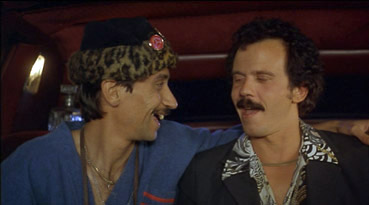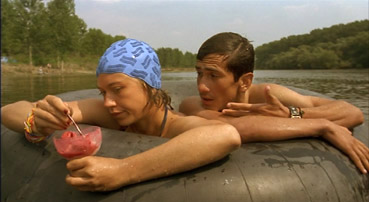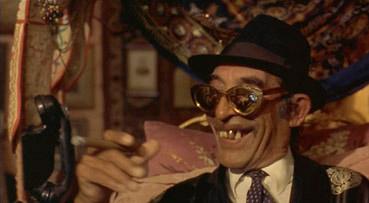|
The
films of Yugoslav director Emir Kusturica have tended to
divide opinion over the years, with his 1995 Underground
annoying almost as many as it delighted, prompting
attacks on the film's politics from some quarters and complaints
about its near to three-hour length and relentlessly
noisy exuberance from others. Similar grumbles were heard
on the release of his more recent and less lengthy
Life is a Miracle, with more than one reviewer
expressing their exasperation at the number of shots that
were decorated with flying chickens and a soundtrack that was over-populated
with bouncy Romany tunes. If you are of this view, then Black
Cat, White Cat [Crna macka, beli macor] will provide little relief – the pace is manic, the music
is as hyper as ever, and while there are no chickens, there
are plenty of geese strategically placed to scatter wildly
as characters stumble through their midst. If, however, you warm
to the Kusturica approach, there is a strong likelihood
that you'll react with considerable delight, and for newcomers to the director's work I can think of
no more enjoyable an introduction to his cheerfully energetic
style.

Set
in a Yugoslav gypsy community on the banks of the Danube,
the story centres on luckless hustler Matko,
who establishes his standing early on by making a
deal with a local boatman for a washing machine and then
immediately falling into the river with it. He hopes to
make a killing on a big deal involving a trainload of fuel,
and to secure funding for the project he approaches ageing
local gang boss Grga, then old acquaintance and flashy gangster
Dandan, who helps him with the cash and then secretly rips
him off. Threatening dire consequences if the money is
not instantly repaid, Dandan offers to write off the debt
if Matko's 17-year-old son Zare agrees to marry the mobster's diminutive
and bad tempered sister Afrodita. Matko agrees to the deal
but Zare is dismayed, having already set his his heart on the
beautiful but tomboyish Ida, and Afrodita is determined
to wait for the man of her dreams.
If
you're expecting politically slanted meditation on Romany
life then you've come to the wrong place – Black
Cat, White Cat is a boisterous romp, a farcical
comedy of love, luck and community whose pace is rarely
less than furious and whose cast perform as if they've all
taken vast quantities of amphetamine sulphate. Kusturica
enhances this sense of hyperactivity with an editing speed
and set decoration that crams scenes with sometimes insane
levels of oddball detail, aided by a score that flits merrily
between semi-comical rock and octane-fuelled jigs by
the director's own No Smoking Orchestra travelling gypsy band.
The
film revels in the grotesque, with half of the cast sporting
spectacularly malformed, gold-capped teeth and missing no
opportunity to flash a wide smile, and every location is a
marvel of barmy production design. This is at once both
expressionistic and yet strangely authentic, a reflection
of the chaotic nature of changing times in Eastern Europe,
where newer technology sits almost anachronistically alongside
props and costumes from a pre-industrial age. This clash
of the traditional and the modern is reflected in the attitudes
of the characters, the elders insisting on marriage for
its own sake ("I'm telling you one last time,"
Grga tells his lanky, unmarried son during a period of ill
health, "find yourself a wife. Now take me to hospital
to recover – I'll come out for your wedding"), while
the younger generation, to the chagrin of their parents,
demand that marriage be for love.

Kusturica
presents this society as relentlessly lively and bristling
with possibility, albeit one dominated by organised crime.
Even this element is presented in such cheerful fashion
that a casual killing of a police official becomes the subject
for farce when his body is hung on a raised jib, an open
umbrella in one hand and Matko's briefcase in the other,
which its hapless owner indulges in a series of acrobatic
pratfalls in a desperate attempt to retrieve. This stream
of black farce is taken a step further with Matko and Zare's
frantic attempts to conceal and preserve the body of a departed
relative by dragging him up to the attic and binding a huge
lump of ice to his chest, ice that melts and drips through
the ceiling onto the bemused but still energetically coked-up
Dandan.
The
film finds humour in even the darkest situations and cheerfully
celebrates the simple joys of everyday existence, however
peculiar they may prove to be. The carefree lunacy with
which the narrative unfolds is matched step for step by
a dizzying patchwork of sometimes surrealistic background
and incidental detail that proves one of the film's principal
pleasures. It brings a delight to every scene and infuses
the film as a whole with an overpowering exuberance that
should put a smile on the face of all but the most world-weary
viewer. After all, how often would you expect to see in
one film a Romany band tied halfway up two trees, a gangster
cheerfully juggling hand grenades, a pig devouring a car,
a bride making her escape under a hollowed-out tree stump,
and a large female singer pulling a six-inch nail from a
wooden pole by clenching it between her buttocks?
Framed
1.85:1 and anamorphically enhanced, this is
for the most part a fine transfer, with detail levels and
contrast very good – colours are not quite true to life,
but this could be deliberate and it's a long time since
I saw it at the cinema, so comparisons are hard to make.
Occasionally there is some minor frame jitter, but this
rarely gets in the way, and with the breeziness of the camerawork
you'd be hard pushed to spot it most of the time. This is
another transfer licensed by Artificial Eye from MK2 in
France, and on the whole it's a very good one.

The
Dolby 2.0 stereo soundtrack is bright and clear and generally
serves the film rather well, with the music in particular
sounding good. Just occasionally it cries out for a 5.1
track to more fully immerse us in the noise and music of
the surroundings, but for the most part this will do well
enough.
Not
much here. The Theatrical Trailer
(1:35) looks to be the one for the film's US release, with
the expectedly cheesy voice-over. The Emir Kusturica
Biography and Filmography is reasonably well
detailed, but the filmography is restricted to his notable
feature work only.
There
will be some who mourn the lack of Underground's
socio-political element and others for whom the assault
of incident, imagery and sound will prove exhausting, but
speaking personally I find Black Cat, White Cat
so energetic, so good natured and so consistently inventive
and entertaining that I have no problems at all wholeheartedly
recommending it. Artificial Eye's DVD is light on extras
but is otherwise a sound enough job, and its long-awaited
release is welcomed in this particular quarter.
|